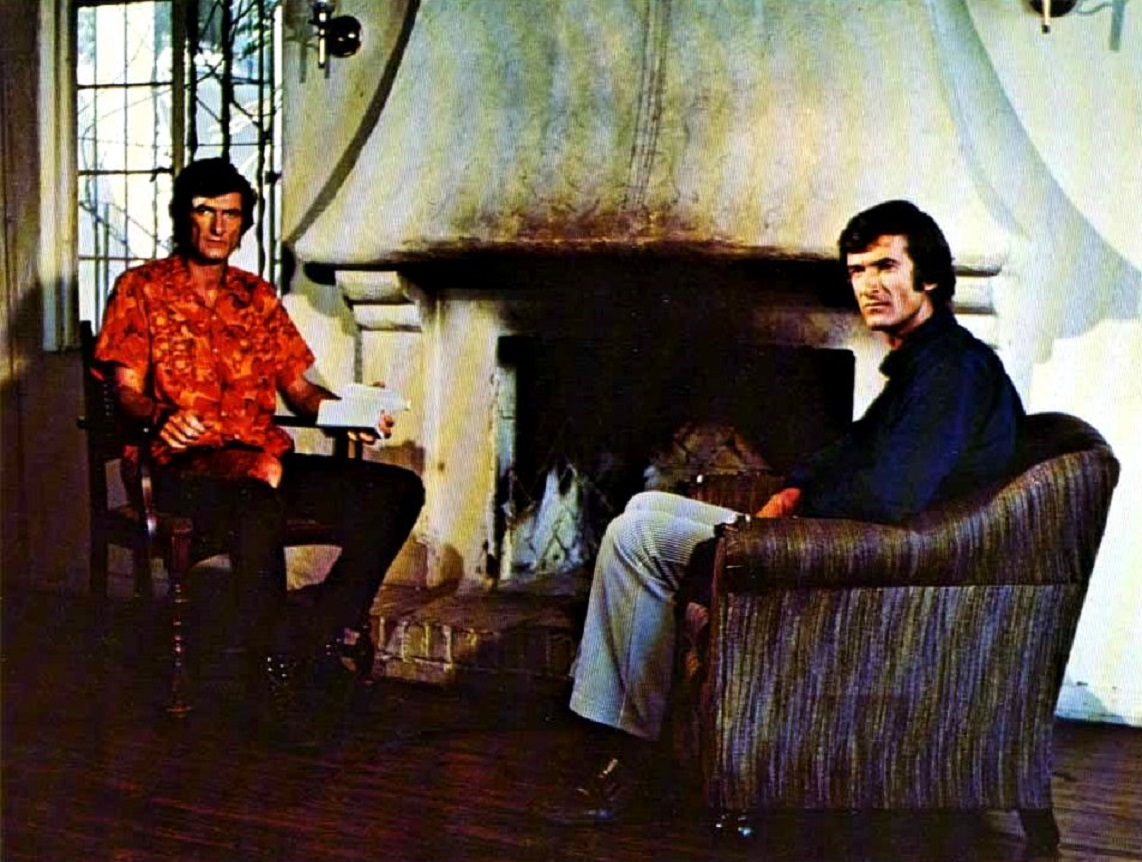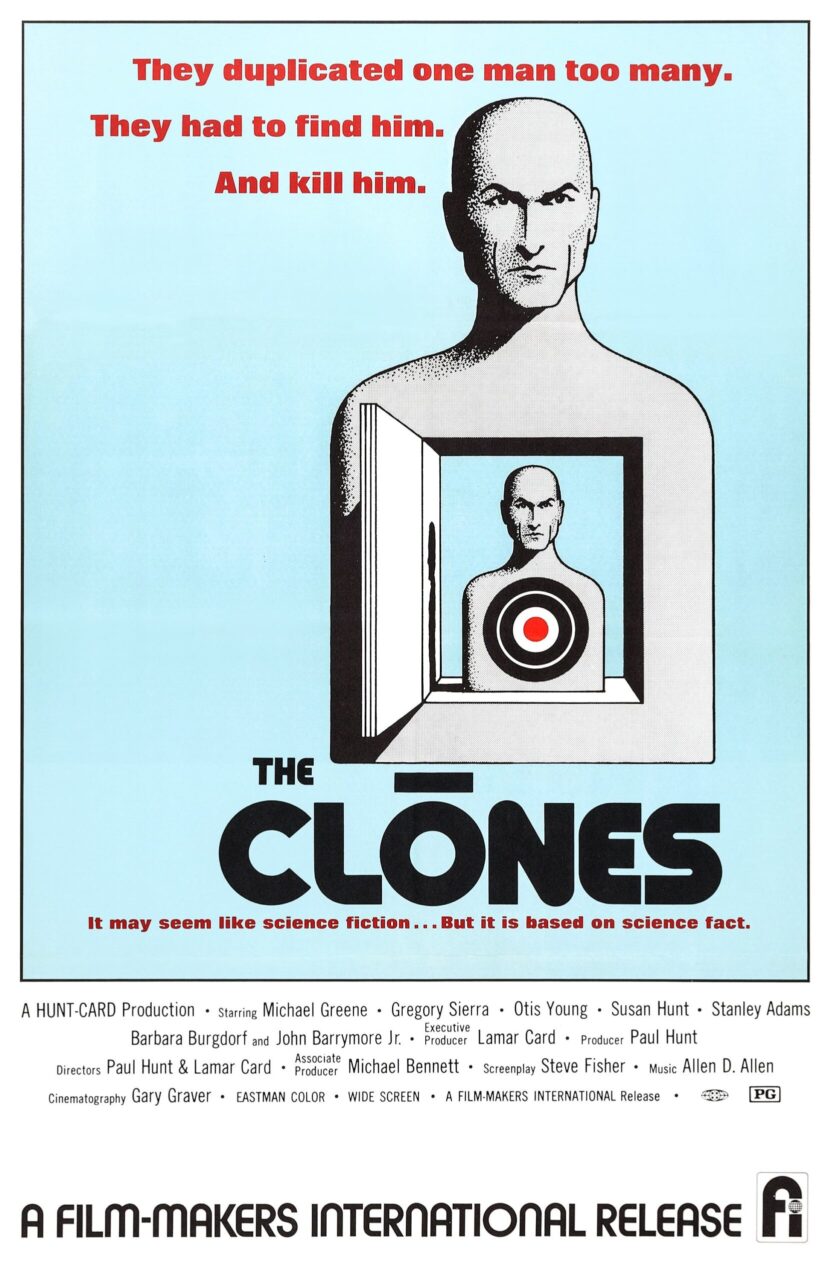Crew
Directors/Story – Lamar Card & Paul Hunt, Screenplay – Steve Fish, Producer – Paul Hunt, Photography – Gary Graver, Music – Allen D. Allen, Special Effects – Harry Woolman, Makeup – Will McKenzie. Production Company – Hunt Card Productions.
Cast
Michael Greene (Dr Gerald Appleby), Gregory Sierra (Nemo), Otis Young (Sawyer), Susan Hunt (Penny), Stanley Adams (Dr Carl Swafford)
Plot
Nuclear physicist Gerald Appleby is startled to discover that an exact duplicate of himself is driving his car, attending his job and seeing his girlfriend. In trying to determine what he is happening, mysterious government agents place Appleby under arrest. Fleeing from his captors, Appleby makes the discovery that he has been cloned.
This obscure thriller has the distinction of being the first film to use the term clone – the theme of cloning was first used in the film The Resurrection of Zachary Wheeler (1971), although was never referred to as cloning. The phrase ‘clone’ had been coined by biologist J.B.S. Haldane in 1963, taken from the Greek word for twig (a term that had been appropriated in horticulture to refer to certain non-seed methods of plant propagation), which Haldane used to speculate about the idea of genetically replicating a frog. The term was applied to replicating people and popularised in the non-fiction work The Biological Time-Bomb (1968) by science journalist Gordon Rattray Taylor. Cloning has become a staple theme of science-fiction ever since. Not to mention how it has become one science-fiction concept that as of 1996 has now been broached in the real world. (For an overview on the cinematic treatment of cloning see Films About Cloning).
The Clones starts out well. It falls into the late 1960s/early 1970s mini-genre of identity puzzle films, along with the likes of The Manchurian Candidate (1962), The Mind Benders (1962), The Face of Another (1966), The Groundstar Conspiracy (1972), The Mind Snatchers (1972) and Who? (1974). There is the wonderfully Philip K. Dick-ian opening where physicist Michael Greene finds that an identical duplicate has stolen his car, visited his secretary, even been seeing his girlfriend, before he is then arrested as an impostor. [Much of the basic idea of The Clones was later borrowed by the big budget action film The 6th Day (2000).]
Alas after a good opening, The Clones drops all interest in the identity puzzle aspects of the story and becomes a long drawn-out pursuit thriller. In fact, there is nothing else to the film except Michael Greene running around the California countryside being pursued by various government agents. Crucially, nothing happens during these sections that advances the plot in any way. It is clear The Clones has no interest in the existential identity crisis aspect that its premise offers – this is evident from the fact that the film has crucial scenes like where Michael Greene’s girlfriend (Susan Hunt) makes the realization that he is the original take place off-screen. (Nor does one understand what the film means by the business of the difference between a clone and the original being that the clone “has to think about who it is”).

Moreover, from the title, not to mention the opening preamble that explains about the possibilities that cloning offers, it is obvious from the start what has happened to Michael Greene – yet the film spends two-thirds of its running time for the central character to arrive at the same realisation that the audience knows from the outset. It may have been different in 1973 but the widespread knowledge of what cloning is today leaves The Clones holding no surprises. In one scene, the film leaps into a surreal dream sequence depicting Michael Greene’s identity crisis with psychedelically tinted mirrored footage, which seems a little too much amidst the film’s otherwise straightforward thriller format. There is at least an effectively downbeat twist ending.
Co-director Paul Hunt went onto make several other low-budget, independently made films, including the horror film Twisted Nightmare (1987) and the cheap Arthurian fantasy October 32nd/Merlin (1992), as well as producing the horror film Demon Wind (1990). Co-director Lamar Card also went onto direct several other low-budget films, including genre efforts such as Supervan (1977) and Shadow Warriors (1996), as well as to produce the Nature Amok film Savage Harvest (1980), the slasher film Terror Train (1980), the action film Immortal Combat (1994) and the cyborg werewolf film Project: Metalbeast (1994).
Trailer here


